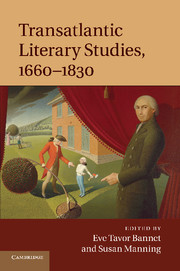Book contents
- Frontmatter
- Contents
- Notes on contributors
- Acknowledgements
- Introduction: British and American genres
- Chapter 1 Transatlantic books and literary culture
- Chapter 2 Transatlantic utopianism and the writing of America
- Chapter 3 Tales of wonder, spiritual autobiographies, and providence tales
- Chapter 4 Life writings
- Chapter 5 Benjamin Franklin and transatlantic literary journalism
- Chapter 6 Theatre, drama, performance
- Chapter 7 Transatlantic American Indians
- Chapter 8 Literature of the ocean
- Chapter 9 “To gird this watery globe”
- Chapter 10 Ghostly and vernacular presences in the black Atlantic
- Chapter 11 Susanna Rowson and the transatlantic captivity narrative
- Chapter 12 Domestic fiction and the reprint trade
- Chapter 13 Transatlantic Gothic
- Chapter 14 Transatlantic Romanticisms
- Chapter 15 Journeys of the imagination in Wheatley and Coleridge
- Chapter 16 Transatlantic historical fiction
- Further reading
- Index
- References
Chapter 9 - “To gird this watery globe”
Freneau, Barlow, and American neoclassical poetry
Published online by Cambridge University Press: 05 January 2012
- Frontmatter
- Contents
- Notes on contributors
- Acknowledgements
- Introduction: British and American genres
- Chapter 1 Transatlantic books and literary culture
- Chapter 2 Transatlantic utopianism and the writing of America
- Chapter 3 Tales of wonder, spiritual autobiographies, and providence tales
- Chapter 4 Life writings
- Chapter 5 Benjamin Franklin and transatlantic literary journalism
- Chapter 6 Theatre, drama, performance
- Chapter 7 Transatlantic American Indians
- Chapter 8 Literature of the ocean
- Chapter 9 “To gird this watery globe”
- Chapter 10 Ghostly and vernacular presences in the black Atlantic
- Chapter 11 Susanna Rowson and the transatlantic captivity narrative
- Chapter 12 Domestic fiction and the reprint trade
- Chapter 13 Transatlantic Gothic
- Chapter 14 Transatlantic Romanticisms
- Chapter 15 Journeys of the imagination in Wheatley and Coleridge
- Chapter 16 Transatlantic historical fiction
- Further reading
- Index
- References
Summary
The idea of transatlantic exchange informing English poetry of the early modern period is an old conception, one that can be traced back as far as Anne Bradstreet's “Dialogue Between Old England and New” (1630), which plays out through the form of a poetic dialogue those frictions between Anglican Establishment and Puritan dissent that permeated the English-speaking world at this time. Bradstreet wrote this work in the same year as she migrated with her husband and parents – her father, Thomas Dudley, was a steward in the Earl of Lincoln's household – to Massachusetts Bay, and her poetry in general mediates stylistically the relative values of courtly Renaissance decorum and individualistic self-scrutiny. In the second half of the twentieth century, Bradstreet was characteristically appropriated as the harbinger of an authentic American idiom by the likes of John Berryman, whose epic “Homage to Mistress Bradstreet” (1956) celebrates her as the first of the confessional poets, and by Adrienne Rich, whose 1966 essay “The Tensions of Anne Bradstreet” installs Bradstreet as the inaugurator of an American feminist tradition in the way she shows “the limitations of a point of view which took masculine history and literature as its center.” In a clear corollary to her own flight in the 1950s and 1960s from poetic formalism into a looser experiential mode, Rich went on in this critical essay to praise Bradstreet for her escape from the generic conventions that had circumscribed her earlier writings: “No more Ages of Man, no more Assyrian monarchs; but poems in response to the simple events in a woman's life.” But what such emancipationist rhetoric ignores are the manifold ways in which Bradstreet creatively reoriented the ritualistic works of Philip Sidney and Guillaume du Bartas in order to exemplify, by dialogic contrast, the ways in which a nonconformist spirit might be able to seek space for itself behind the elaborate monuments of European courtly traditions. Bradstreet's poetry always needs the models of Sidney and Bartas to play itself off against; her work is not sequentially English and then American, but transatlantic from first to last.
- Type
- Chapter
- Information
- Transatlantic Literary Studies, 1660–1830 , pp. 139 - 153Publisher: Cambridge University PressPrint publication year: 2011



